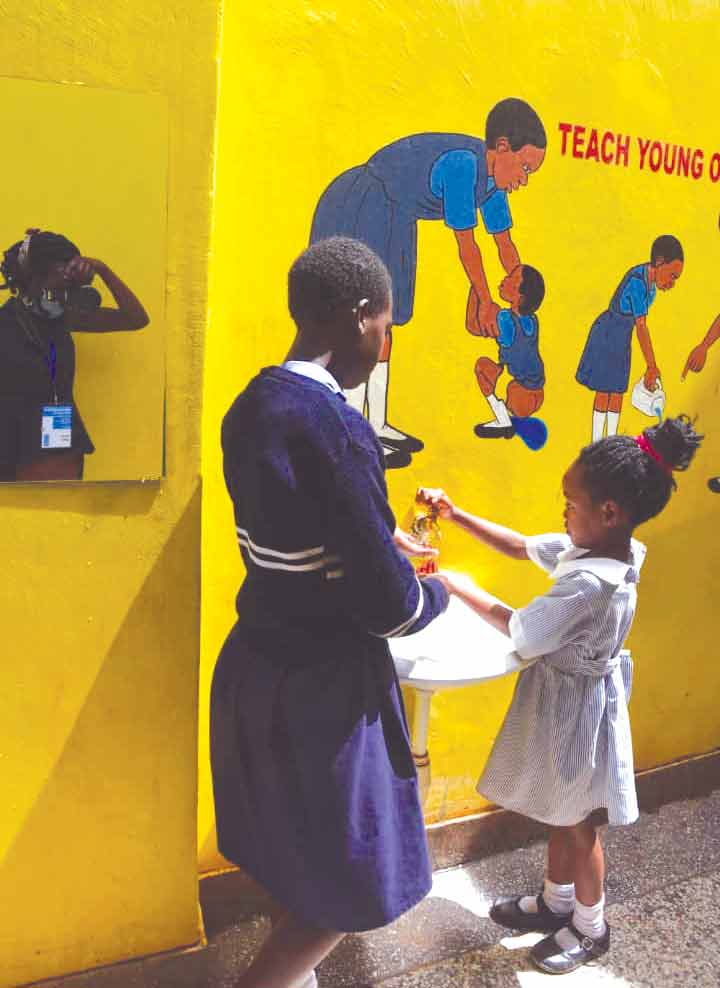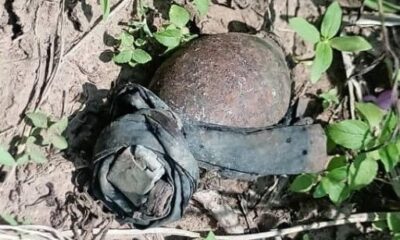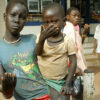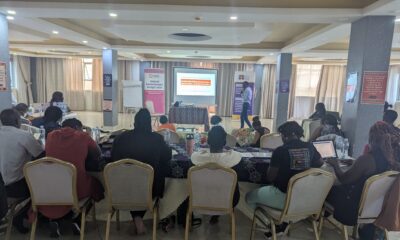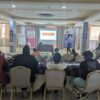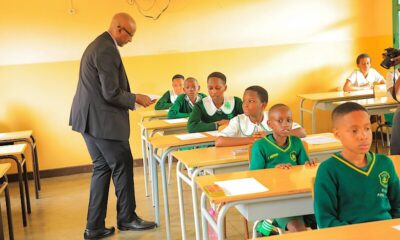News Feature
SusWASH; Innovations on expanding Water & Sanitation in cities
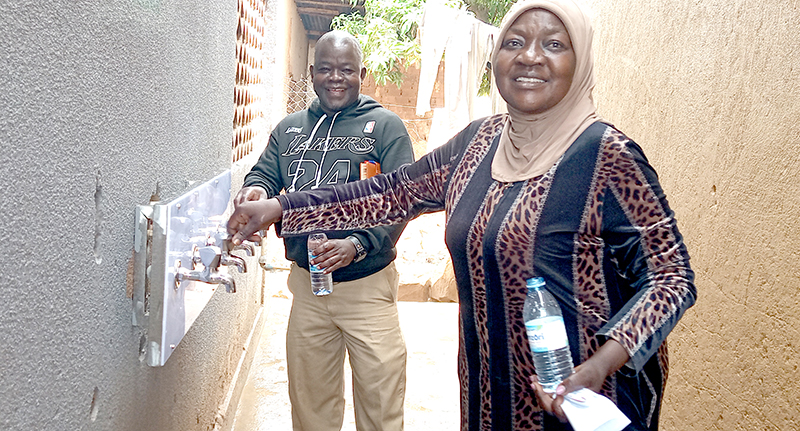
Mirembe Pri. School Head Mistress Ms. Bako Hanifa and the School’s In-charge of Sanitation Mr. Onenchan Wilberforce are excited to show the safe drinking water facility that was provided by WaterAid
Girl students of Mirembe primary school, found in Boston village of Makindye Division, in Kampala City, have since getting a new gender-friendly single-flush toilet, had to be often reminded by their prefects to resume classes at the end of tea and lunch breaks, thanks largely to the comfort they enjoy while in the places of convenience.
This was one of the testimonies of Ms. Hanifa Bako, the Headmistress of the government-aided school that hosts an estimated 1000 students, majority of whom come from less privileged households.
It is a complete change in fortunes for the school which was struggling with a dilapidated stinking toilet that often sparked outbreaks of diarrhea and forced girls to stay away especially whenever they experienced their menstruation.
“Due to the poor state of the toilets, we used to register high absenteeism especially for the girls during their menstrual periods, and many children complained about diarrhea or stomach ache,” said Bako.
The completion of the toilet which has separate entrances for female and male students, as well as a disposal tank for used sanitary pads on the girls’ side and two convenient stances for students with disabilities, has changed the sentiments around the toilet from despair to comfort.
The 14-stance gender-friendly toilet has created an inviting atmosphere not only for the girl students of the school, but also for parents and members of the community who have demonstrated willingness to contribute money towards ensuring that it is maintained properly.
Mirembe Primary School is one of the five lucky community schools in Kampala where such a toilet was built under a five-year SuSWASH programme that was meant to demonstrate how sustainable management of Water, Sanitation and Hygiene facilities can contribute to improving outcomes in health, education and generally a better environment in the area.
The Sustainable Water, Sanitation and Hygene (SusWASH) was a five-year project (2017-2022) that was implemented in the greater Kampala Metropolitan area that comprises the districts of Kampala, Wakiso and Mukono.
Conceived by WaterAid Uganda, and funded by H&M Foundation based in Sweden, the project was jointly implemented through a multi-stakeholder partnership that involved Kampala Capital City Authority (KCCA), local government leaders across the Greater Kampala Metropolitan Area, the Ministry of Health as well as grassroots community mobilisers.
Besides benefiting students through increased school days and improved health, the project equally resulted into improvements in maternal health as illustrated by the increased number of expectant mothers who frequented the two health facilities where improved toilets were built.
As WaterAid reported, attendance by women at the two health centres, namely Ndejje Health Centre IV and Nabweru Health Centre III, significantly increased following the establishment of the toilet facilities which have lessened the fear among expectant mothers of contracting infections as the case was before the sanitation was improved.
“There has been a steady increase in the number of mothers using the health Centre for childbirth rising from 365 mothers in 2017 to 800 mothers in 2020 accessing antenatal services per month in Ndejje HCIV,” said WaterAid.
Nurturing accountability seeking behaviours
The appalling state of sanitation in many of Kampala’s informal settlements such as Kamwokya, Katanga and Makerere Kivulu was not ignored. The project identified grassroots community leaders to champion a mindset change mentality among the residents so as to embrace good sanitation practices.
Working with local groups such as Weyonje in Kamwokya, the project provided cleaning tools such as wheelbarrows, spades, hoes and gumboots to enable people to unblock clogged drainage channels that often result into flooding and the associated challenges such as cholera outbreaks.
Innovation has been a common thread running through all the interventions of SusWASH, with the primary focus being put on sustainability of the initiatives after the project has closed.
For example, in schools where the enviable toilets were built, special interest was taken to ensure that the institutions are able to independently keep the facilities running efficiently after the engineers leave.
The introduction of a single-flush technology for the toilets, for example, has proved to be a worthwhile innovation that greatly lowers the water bills for the school, while also lowering the cost of toilet emptying by the city authority.
In addition to the single-flush technique, the project encouraged the integration of WASH in the school’s budgeting processes to ensure sustainability, in addition to improving water harvesting at the school.
Realizing the benefits of improved access to Water and Sanitation at the school, the school management committee at Mirembe Primary School, according to Ms. Bako, was persuaded to approve a UGX5000 levy to be contributed by each child every term, specifically to cater for maintenance of WASH facilities at the school.
According to WaterAid, this sustainability mechanism has been introduced in all the schools that were provided with Water and Sanitation facilities.
When it came to ensuring that the gains made in the informal settings are maintained, the project empowered community leaders to take charge of their own WASH affairs, in addition to creating platforms where they regularly meet with technocrats from KCCA to talk about WASH budgets and set priorities.
Christopher Tumwine, the Coordinator of Weyonje group, one of the grassroots organisations that were supported by WaterAid in Kamwokya noted that the project led to the creation of a community self-mobilization campaign that ensures that residents immediately report anyone who releases feacal material whenever it rains as the case had been before the project started.
“We introduced a system where we schedule emptying of toilets on specific dates working with a private company. This helps to lower the unit cost of emptying for household by ensuring that the private service provider is able to get many customers on the same day,” says Tumwine.
Perhaps the most revolutionary of SusWASH’s interventions can be traced from the way the project empowered leaders from the grassroots and communities to follow tax payers’ money and hold to account those who occupy positions of responsibility especially when it comes to delivering services in the Water, Sanitation, Hygiene and Health sectors.
Christopher Tumwine, the Coordinator of Weyonje group, a community organization based in Kamwokya slum, told The Sunrise that WaterAid linked them up with the Civil Society Budget Advocacy Group (CSBAG) who taught them how to track tax payers money from the time the budgets are made until the money is disbursed.
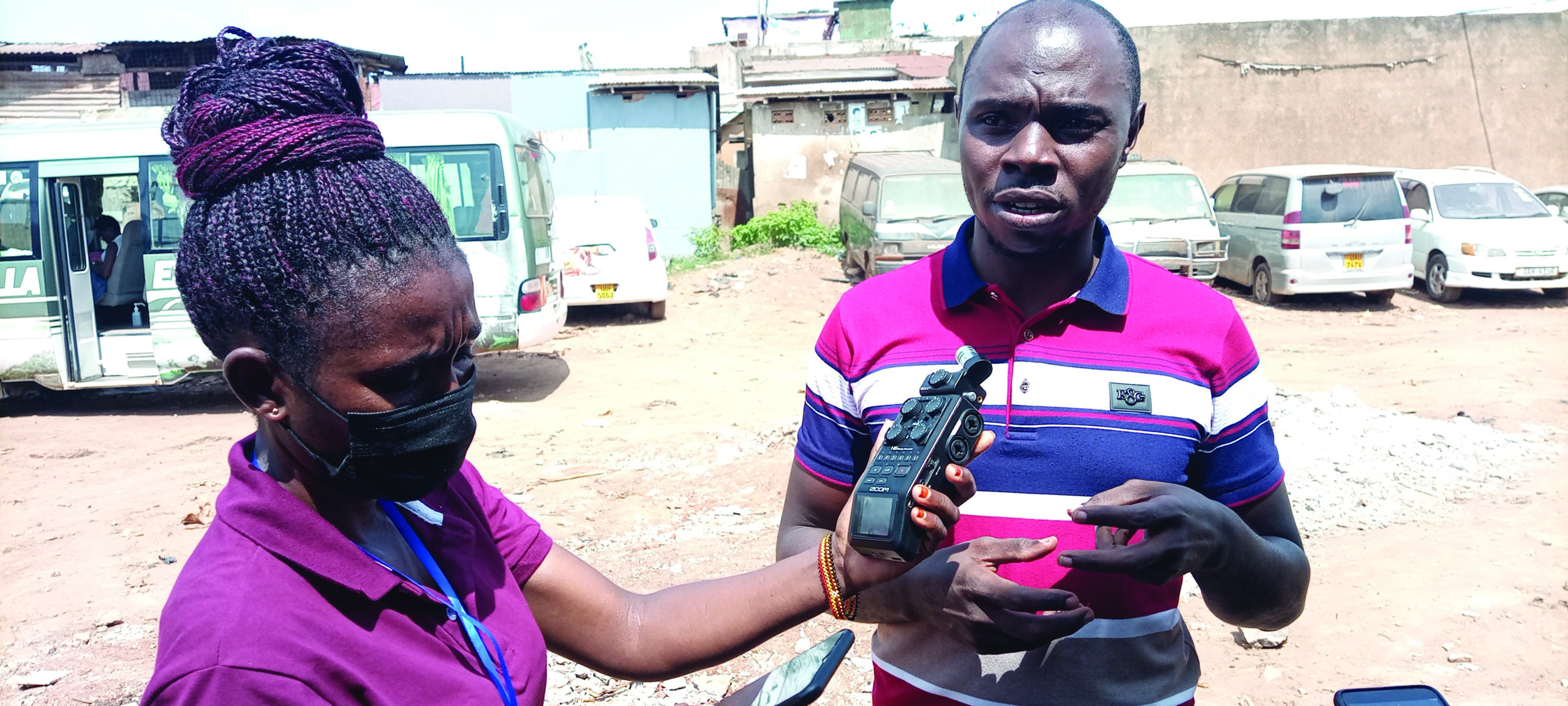
Christopher Tumwine of Weyonje community group in Kamwokya talks to a journalist on how they have tackled the challenge of poor sanitation in their. Photo by: Jennifer Asiimwe
“We are members of participatory budget clubs that were created by CSBAG with support from WaterAid. Through these clubs, CSBAG has been training us on the budget process which has sharpened our ability to follow the money by knowing who is responsible as well as what are the set standards of services expected from the government.”
Weyonje, with additional support from WarterAid, started monitoring health facilities to establish how the government hospitals had used the money that had been allocated to them.
“Following the training, we started going to hospitals to ask what had they done with the money that the government had released. What we found, the first time we did this, is that most of the money that had been allocated for some of the key services such as maintaining water taps, ambulance operations, and ensuring that toilets are running properly, had never been done. And when we asked some of the hospital administrators why they had not used the money, they would say the money came late.”
The first time they did this, Tumwine recalls, the hospital administrators tried to hesitate to account, and sometimes put up obstacles such as asking them to present official letters from the Chief Administrative Officers (CAO). But having been sensitized about their rights as citizens in demanding for accountability, Tumwine and his team insisted and re-asserted themselves by educating the ignorant officers about their duties.
Tumwine notes that over the past three years of doing the budget monitoring, a lot has changed.
“We have realized that especially in hospitals, things have changed. After making our inspection and reporting to CSBAG on what we find on the ground, the next time we have gone back to the same hospital, we have seen that some of the things that were budgeted for had been fixed.”
Apart from tracking funds, the group reports on the existing facilities vis-à-vis the government’s own set standards.
Tumwine explains: “We report on the situation on the ground such as the status of toilets in a given school vis-à-vis the government’s own standards. We transmit this information to CSBAG, which translates into something that must be budgeted for in the next planning and budget cycle.”
At the policy and management level, SusWASH encouraged the development of investment plans for Water Sanitation and Hygiene at City and all municipal councils.
The investment plans are meant to ensure that local governments integrate WASH across the value chain of service delivery.
As Daniel Okello Ayen, the Director of Public Health and Environment at KCCA remarked, they have been forced to rethink the way some of the services can be delivered, alongside other social services.
“We realized that adding a WASH facility to a road construction plan would be cheaper than if one was to procure for delivery of these services separately,” said Dr. Okello.
According to Okello, they want to work out an arrangement where modern public toilets are built alongside restaurants facilities on all the roads they build, and partner with private companies to manage the places to ensure sustainability.
During a dinner that was held last week at Golden Tulip in Kampala, to mark the closure of the project, many speakers hailed the numerous innovations brought to life by the project, which they argued, offer hope for ensuring that WASH issues gain more resources both at government, community and individual levels.
But as WaterAid’s County Director Jane Sembuche acknowledged, the unmet need for water, sanitation and hygiene in Greater Kampala remains enormous.
“There is so much that still needs to be done in terms of increasing access to WASH, but also in terms of changing the mindset of the people to abandon practices such as open defecation that is rampant in Kampala and other urban areas,” said Sembuche.
Indeed, as the late MP Ibrahim Abiriga, demonstrated when he urinated on a fence along Kyaggwe road in Kampala in 2017, many people in Kampala still don’t know that urinating in the open is a form of open defecation and therefore something to be ashamed of.
Going forward therefore, creating awareness about the importance of WASH at all levels of society, coupled with increased advocacy for resources, will be needed to scale up the achievements realized under SusWASH as the country moves towards achieving the bigger goals on access to water, sanitation and hygiene under the UN Sustainable goals agenda by 2030.
Comments



